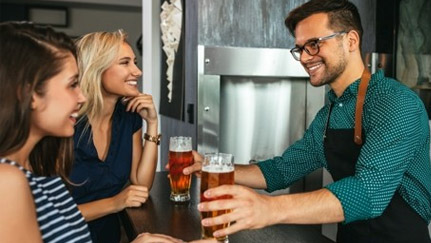Dram shop liability: Sellers and servers beware

A commercial establishment that sells alcohol could be held civilly liable in some situations where an individual causes intoxication-related injuries or damages. There are steps you can take to protect your business.
For businesses that sell or serve alcohol, an isolated incident of serving or selling to an underage or intoxicated person could result in a significant financial impact to the company in the form of a costly lawsuit, negative publicity and more. In 2022, the National Highway Traffic Safety Administration (NHTSA) estimated that 13,524 people died in alcohol-related crashes in the United States. This is the second year in a row that more than 13,000 people died in drunk driving crashes, which is a level not seen since 2007. For state governments looking to curb the financial drain that excessive drinking causes, the CDC recommends a number of strategies, including holding alcohol retailers liable for injuries and damages caused by their intoxicated or underage customers. While the laws governing alcohol-related liability vary from state to state, there are a number of statutes, regulations, ordinances and common law principles that can result in the alcohol seller or server being held liable.1 A state’s dram shop act is one way in which a business can be held liable for damages caused by a person to whom they sold or served the intoxicating beverage.
A dram shop is a commercial establishment that sells alcoholic beverages, such as a tavern, bar, brewery, winery, liquor store, convenience store or restaurant.2 Legislatures in at least thirty states have enacted dram shop laws, allowing these types of establishments to be held civilly liable for selling or serving alcohol in certain situations to an individual that causes intoxication-related injuries and damages.2 Some dram shop laws limit liability to cases where alcohol was sold or served to an obviously intoxicated person or a minor. Others limit liability to only cases involving the sale or serving of alcohol to minors. With respect to intoxicated persons, dram shop acts generally require an analysis of whether the establishment knew or should have known that the individual was so intoxicated that additional alcohol would result in the individual or third parties being injured or damaged. Summaries of each state’s dram shop liability statutes may be found here.Businesses should know and understand the laws that apply to the operation of their business and should also take steps to mitigate the risks associated with serving alcohol. In order to protect its finances and reputation, a business that sells or serves alcohol should consider the following loss control measures:
- Ensure they have clear policies and procedures with respect to the service of alcohol, including clearly defined roles and responsibilities for different positions.
- Seek the advice of a qualified attorney for laws regarding the sale and service of alcoholic beverages.
- Properly train staff, especially bartenders and servers. Topics should include:
- Requirements regarding the sale and service of alcoholic beverages.
- Identifying signs of impairment and encourage customers to use alternate transportation to get home, such as Uber, Lyft or a taxicab.
- How to handle intoxicated patrons.
- When to “cut-off” a customer or refuse entry to a visibly intoxicated person
- Provide refresher training for staff as appropriate.
- Promote the availability of non-alcoholic beverages and discourage customers from becoming intoxicated.
For more information, please see the Loss Control Services technical bulletin on liquor liability.
- Some states have also allowed “social hosts” to be held liable for damages caused by individuals to whom they provided alcohol at a private function, a topic beyond the scope of this article.
- https://www.ncsl.org/research/financial-services-and-commerce/dram-shop-liability-state-statutes.aspx
